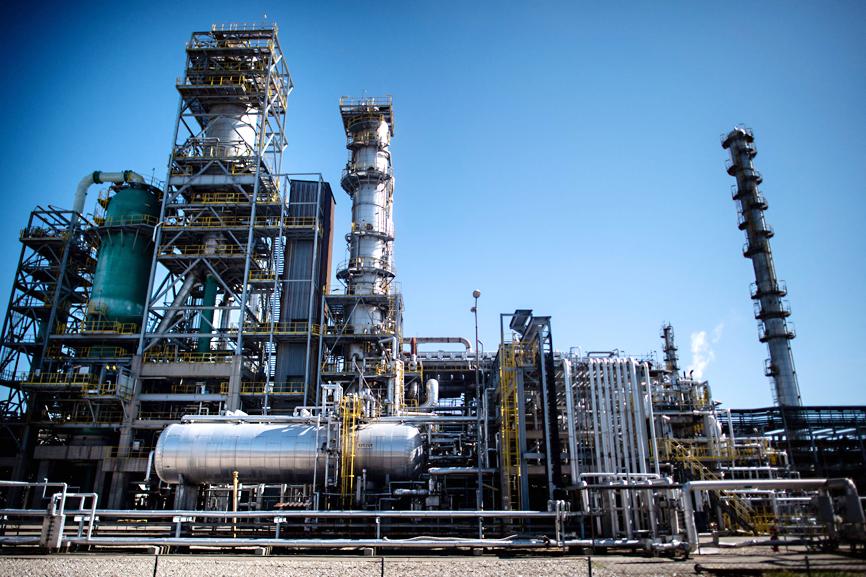West Texas Intermediate (WTI) set its fourth straight weekly gain as product markets remain tight amid healthy demand, eclipsing concerns about an economic slowdown that have roiled financial markets.
WTI for June delivery rose 0.35 percent to settle above US$110.28 a barrel, after fluctuating in a session where equities slid closer to a bear market, weighing prices.
Despite the choppy trading, it posted its best run of weekly increases since the middle of February.

Photo: AFP
Brent crude for July delivery increased 0.46 percent to US$112.55 a barrel.
Rising demand for motor fuels and shrinking inventories ahead of the summer driving season underscored a fundamentally tight supply situation even as broader economic fears shook equity markets.
“There continues to be a disconnect between the risk financial markets associate with crude financial assets and the physical market that is trying to digest SPR [Strategic Petroleum Reserve] releases to meet product demand,” CIBC Private Wealth Management senior energy trader Rebecca Babin said. “This dichotomy keeps markets fragmented and volatile — it could end up being a cruel summer for energy traders.”
Crude has surged almost 50 percent this year, also helped along by Russia’s invasion of Ukraine that sent shock waves through markets.
While the US and UK have announced bans on Russian exports, flows to Asia have picked up. China is seeking to replenish strategic stockpiles with cheap Russian oil even as officials grapple to suppress COVID-19 outbreaks. India has also boosted purchases.
There were mixed signals from China on Friday. While banks cut a key interest rate for long-term loans by a record to bolster a slowing economy, Shanghai found the first cases of COVID-19 outside quarantine in six days. It raises questions about whether the easing of the city’s lockdown would be affected.
Traders are also keeping a close eye on the refined products market, as a a global crunch on inventories coincides with the beginning of the summer driving season.
Additional reporting by staff writer

Vincent Wei led fellow Singaporean farmers around an empty Malaysian plot, laying out plans for a greenhouse and rows of leafy vegetables. What he pitched was not just space for crops, but a lifeline for growers struggling to make ends meet in a city-state with high prices and little vacant land. The future agriculture hub is part of a joint special economic zone launched last year by the two neighbors, expected to cost US$123 million and produce 10,000 tonnes of fresh produce annually. It is attracting Singaporean farmers with promises of cheaper land, labor and energy just over the border.

US actor Matthew McConaughey has filed recordings of his image and voice with US patent authorities to protect them from unauthorized usage by artificial intelligence (AI) platforms, a representative said earlier this week. Several video clips and audio recordings were registered by the commercial arm of the Just Keep Livin’ Foundation, a non-profit created by the Oscar-winning actor and his wife, Camila, according to the US Patent and Trademark Office database. Many artists are increasingly concerned about the uncontrolled use of their image via generative AI since the rollout of ChatGPT and other AI-powered tools. Several US states have adopted

KEEPING UP: The acquisition of a cleanroom in Taiwan would enable Micron to increase production in a market where demand continues to outpace supply, a Micron official said Micron Technology Inc has signed a letter of intent to buy a fabrication site in Taiwan from Powerchip Semiconductor Manufacturing Corp (力積電) for US$1.8 billion to expand its production of memory chips. Micron would take control of the P5 site in Miaoli County’s Tongluo Township (銅鑼) and plans to ramp up DRAM production in phases after the transaction closes in the second quarter, the company said in a statement on Saturday. The acquisition includes an existing 12 inch fab cleanroom of 27,871m2 and would further position Micron to address growing global demand for memory solutions, the company said. Micron expects the transaction to

A proposed billionaires’ tax in California has ignited a political uproar in Silicon Valley, with tech titans threatening to leave the state while California Governor Gavin Newsom of the Democratic Party maneuvers to defeat a levy that he fears would lead to an exodus of wealth. A technology mecca, California has more billionaires than any other US state — a few hundred, by some estimates. About half its personal income tax revenue, a financial backbone in the nearly US$350 billion budget, comes from the top 1 percent of earners. A large healthcare union is attempting to place a proposal before